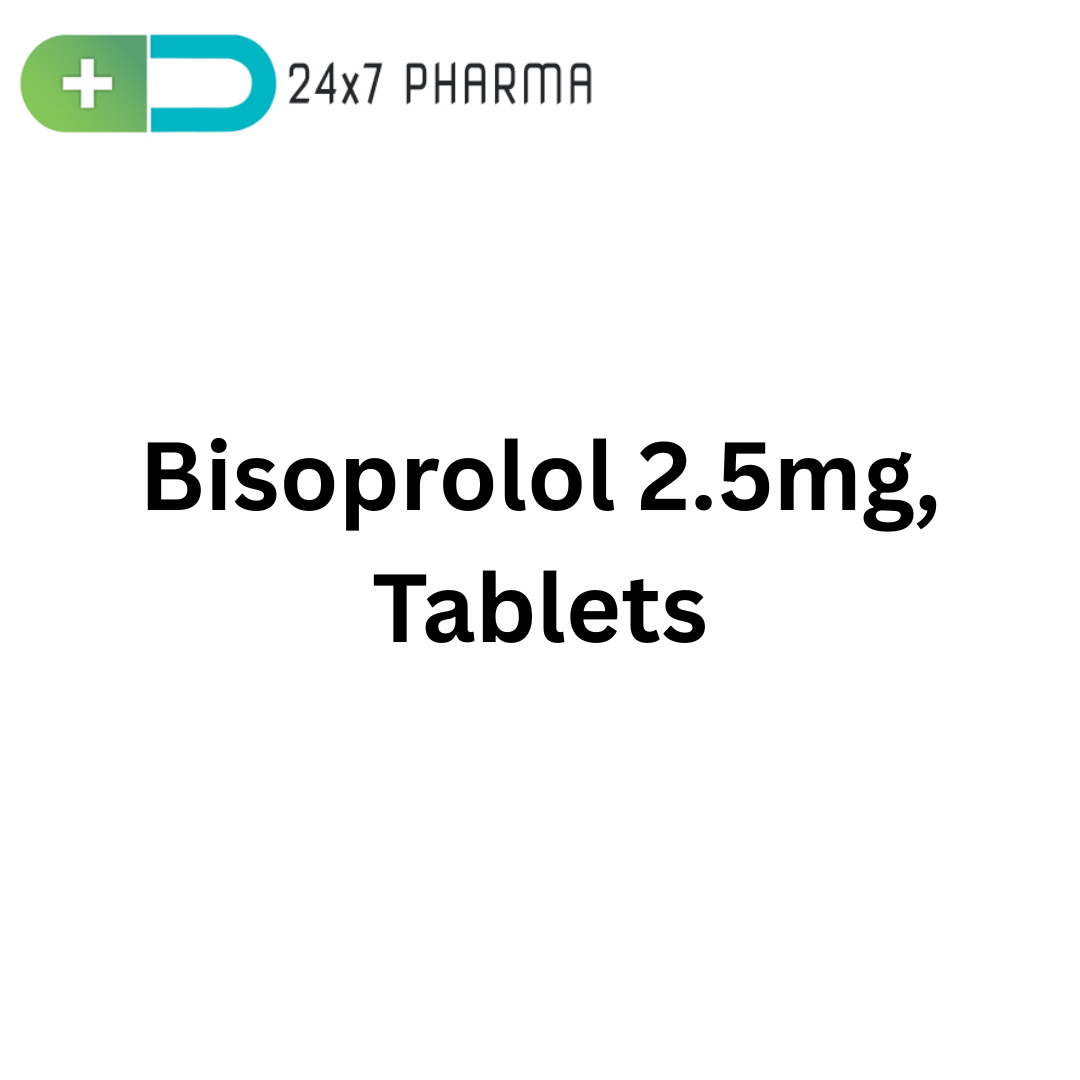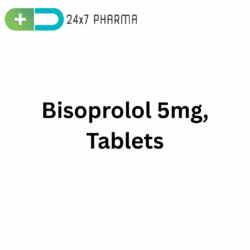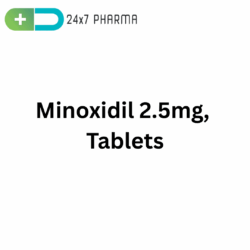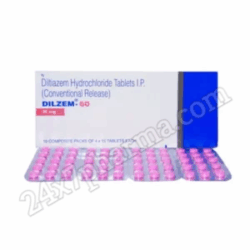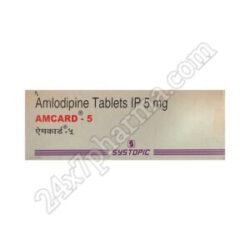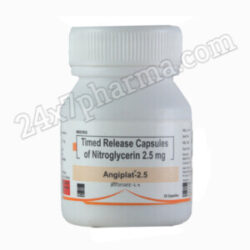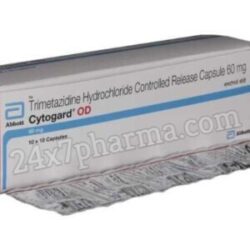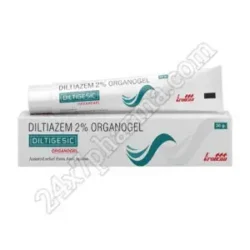Corbis 2.5mg, Bisoprolol Tablets
Bisoprolol fumarate, sometimes referred to as a selective beta-1 adrenergic receptor blocker or beta-blocker, is an ingredient in the prescription drug Corbis 2.5mg. It is widely prescribed for the management of hypertension (high blood pressure), angina pectoris (chest pain due to heart disease), and chronic heart failure. By reducing the strain on the heart and lowering blood pressure, Corbis helps in preventing heart attacks, strokes, and related cardiovascular complications.
What is Corbis 2.5mg?
Corbis 2.5mg contains Bisoprolol, a cardioselective beta-blocker. It works mainly on the heart rather than the lungs, which makes it safer compared to non-selective beta-blockers for patients with respiratory issues such as mild asthma or COPD.
- Generic Name: Bisoprolol fumarate
- Brand Name: Corbis
- Drug Class: Beta-blocker (Beta-1 selective)
- Strength: 2.5mg per tablet
How Does Corbis 2.5mg Work? (Mechanism of Action)
By specifically inhibiting beta-1 adrenergic receptors in the heart, bisoprolol acts. Normally, adrenaline (epinephrine) and noradrenaline stimulate these receptors, leading to:
- Increased heart rate
- Stronger heart contractions
- Increased cardiac output
- Elevated blood pressure
By blocking these effects, Corbis:
- Reduces heart rate (negative chronotropic effect) – lowers the number of beats per minute.
- Decreases myocardial contractility (negative inotropic effect) – reduces the force of contractions, making the heart’s work easier.
- Decreases cardiac output – reduces overall blood pressure.
- reduces the heart’s oxygen demand, which is beneficial for angina.
- This overall “cardioprotective” effect helps the heart work more efficiently and prevents excessive strain.
How to Use / Indications
Corbis 2.5mg is prescribed in various cardiovascular conditions, including:
- Hypertension (High Blood Pressure)
- lowers the risk of heart attack and stroke and aids in blood pressure regulation.
- Angina Pectoris (Chest Pain due to Coronary Artery Disease)
- Reduces frequency and severity of angina episodes.
- Chronic Heart Failure (CHF)
- Used as part of combination therapy to improve heart function and survival.
- Arrhythmias (Irregular Heartbeats) – sometimes prescribed for heart rhythm control.
How to Take / Dosage
The patient’s age, reaction, and medical condition all affect the 2.5mg dosage of Corbis. Always take it under a doctor’s supervision.
Usual Adult Dose (Hypertension/Angina):
- 5–10mg once daily. a Maximum recommended dose is 20mg once daily.
- For Heart Failure: Treatment usually starts with a very low dose (1.25mg) and gradually increases to 10mg once daily, as tolerated.
Administration:
- Take orally, with or without food.
- Swallow the tablet with water.
- Take at the same time every day for best effect.
Other Dosages
Corbis (Bisoprolol) is available in different strengths:
- Corbis 2.5mg
- Corbis 5mg
- Corbis 10mg
This allows doctors to adjust the dose based on patient requirements.
Side Effects
Like all medicines, Corbis 2.5mg may cause side effects. Most are mild and improve as the body adjusts.
Common Side Effects
- Fatigue, tiredness
- Dizziness, lightheadedness
- Slow heart rate (bradycardia)
- Cold hands and feet
- Headache
Less Common but Serious Side Effects
- Shortness of breath (rare in cardioselective beta-blockers, but possible)
- Chest pain worsening in some cases
- Swelling of ankles/feet
- Severe dizziness or fainting
- Depression or mood changes
- Allergic Reactions (Rare)
- Rash, itching, swelling
- Difficulty breathing
- Seek immediate medical help if severe side effects occur.
Storage
- Store in a cool, dry place below 25°C.
- Protect from direct sunlight and moisture.
- Keep away from children and pets.
- Do not use it after an expiry date.
Benefits of Corbis 2.5mg
- Good blood pressure management reduces the risk of heart attack, stroke, and kidney damage.
- Protects the heart – reduces oxygen demand, beneficial in angina.
- Improves survival in heart failure – helps the heart pump more efficiently.
- Well tolerated – selective action on the heart reduces lung-related side effects.
- Convenient once-daily dosing – improves patient compliance.
Prescription
- Corbis 2.5mg is a prescription-only medicine (POM).
- It should only be taken under the supervision of a cardiologist or physician.
- Self-medication or abrupt discontinuation can be dangerous.
Drug Interactions
Corbis may interact with other medicines:
Major Interactions
- Calcium channel blockers (verapamil, diltiazem): may cause excessive slowing of the heart.
- Antiarrhythmics (amiodarone, digoxin): increased risk of bradycardia.
- Clonidine: sudden withdrawal may cause severe hypertension.
Other Interactions
- Insulin & oral antidiabetics: may mask signs of low blood sugar.
- NSAIDs (ibuprofen, diclofenac): may reduce blood pressure-lowering effect.
- Anesthesia drugs: may enhance heart-slowing effects during surgery.
- Always inform your doctor about all medications and supplements you take.
FAQs
Can I stop taking Corbis 2.5mg suddenly?
No. Stopping suddenly may cause rebound hypertension, chest pain, or heart attack. Always taper under medical advice.
Can I take Corbis with food?
Yes, it can be taken with or without food. Consistency is important.
Is Corbis safe for asthma patients?
As a cardioselective beta-blocker, it is safer than others, but still may cause bronchospasm. Caution is advised.
How long does Corbis take to work?
Blood pressure lowering is seen within hours, but full benefits may take 2–6 weeks.
Conclusion
Corbis 2.5mg (Bisoprolol tablets) is a highly effective and well-tolerated beta-1 selective blocker used in hypertension, angina, and heart failure. By slowing the heart rate, reducing cardiac workload, and lowering blood pressure, it plays a crucial role in protecting against major cardiovascular events. However, it must always be taken under medical supervision, as inappropriate use or sudden discontinuation can be harmful. With proper dosing, monitoring, and lifestyle adjustments, Corbis significantly improves heart health and overall quality of life.

